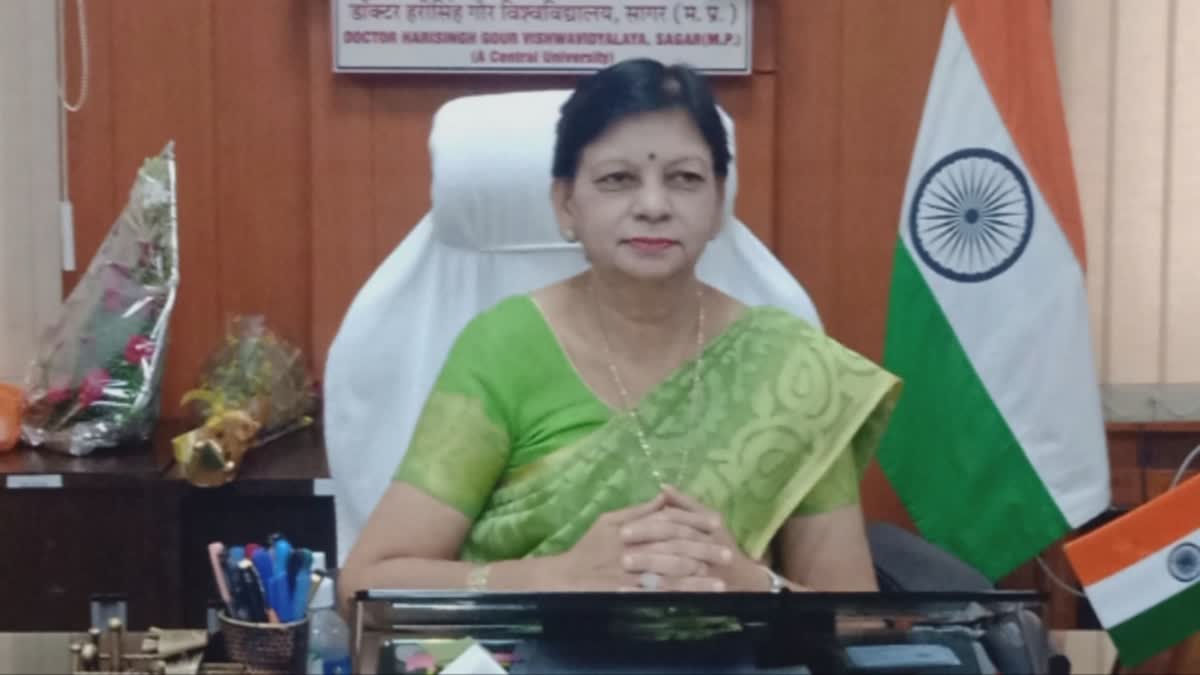Sagar: In a significant development with regard to semiconductor technology, Dr. Harisingh Gour Central University in Sagar district of Madhya Pradesh will train students through student and faculty exchange programs with Taiwanese varsities specifically considering Taiwan's expertise in semiconductor manufacturing, sources said.
Apart from this, partnership will also be done in the fields of Physics, Earth Science, Life Science and Human Sciences. Vice Chancellor of Central University Sagar, Prof. Neelima Gupta who along with a top Indian delegation visited Taiwan recently, had an exclusive conversation with ETV Bharat. Prof Neelima said that the delegation participated in the ‘Yushan Forum on Asian Dialogue for Innovation and Progress on Talent Exchange and Enhance Regional Resilience’ and discussed ongoing international cooperation with Taiwanese universities.
She said that the delegation visited Taiwan's National Taipei Technological University (Taipei), National Central University (Taoyuan), National Tsing Hua University (Hsinchu), National Yang Ming Chiao Tung University (Hsinchu), National Chung Hsing University (Taichung), National Cheng Kung University. (Visited Tainan).
Apart from getting to know about the facilities of Taiwan's universities, the delegation also discussed mutual cooperation with subject experts and key officials regarding research and educational programs. Experiences of Indian students, she said. The delegation that reached Taiwan met the Indian students in Taiwan who are gaining expertise in Semiconductor technology, Physics, Geology, Anthropology and Life Sciences.
Prof Neelima said that the Indian students told the delegation that they chose to study in Taiwan to pursue their areas of interest. “In Taiwan, emphasis is placed on experience-based learning. Our teachers make sure that we really learn, that we understand the technology and are able to maintain the equipment on our own,” the VC quoted the Indian students as saying.
The students said that after returning to India after studies, they will contribute to the overall development of India by building semi-conductor facilities. Semiconductors have the properties of both good conductor and bad conductors of electricity. Semiconductor mainly works to control the electric supply. They are made from silicon.
In semiconductors, the conductive properties are changed through special techniques. Using the technology, electric circuit chips are made through which data processing takes place. In a way, semiconductors act as the brain of electronic devices. Taiwan is the world's largest player in semiconductor manufacturing.
Taiwan alone fulfills 60 percent of the world's semiconductor needs. India imports semiconductors on a large scale from Taiwan. In today's era of Artificial Intelligence, the role of semiconductor has become very important. Apart from mobiles, cars, computers, semiconductors are being used in small and big machines for domestic and commercial use.
Also read: MP: University student generates electricity from grass
India is still dependent on Taiwan in semiconductor manufacturing. In view of the Corona epidemic and tensions between China and Taiwan, the supply of semiconductors in the international market was deeply affected. In such a situation, on August 15, 2022, from the ramparts of the Red Fort, Prime Minister Narendra Modi stressed about becoming self-reliant in this field, drawing attention to the increasing impact of semiconductor technology and its needs in India.
Sagar University Vice Chancellor Professor Neelima Gupta said that Taiwan is the leader in the world in the field of semiconductors. “I visited the universities there. National Taipei University of Technology ranks first in the world in semiconductor technology. There are very good laboratories there and a separate institute for semiconductors,” she said.
She said that they are looking at the possibilities of how our students can take advantage of this. She said that the Sagar university has entered into an agreement through which students can take admission directly in any Taiwanese university or through the Taiwan government. “The university there is very good in terms of scholarship and funds.
Even though there is no provision of scholarship in the graduate course. But there is a provision for scholarship in Master's degree and PhD. Apart from the government, the university also gives scholarships there,” Prof Neelima said. Apart from this, exchange of faculty has also been agreed upon, she added. “We have also discussed the dual degree program with the Deputy Minister of the Education Department there, where students study here for two years and then study in Taiwan”.
Prof Neelima said that Sagar University is preparing to enter into an agreement in the matter of academic degree and research. “Apart from semiconductor, we can also sign agreements with Taiwan in physics, life science, anthropology, earth science and pharmacy. We have established an international cell in Sagar University. Soon all the information will be given to the students on this,” she said.



